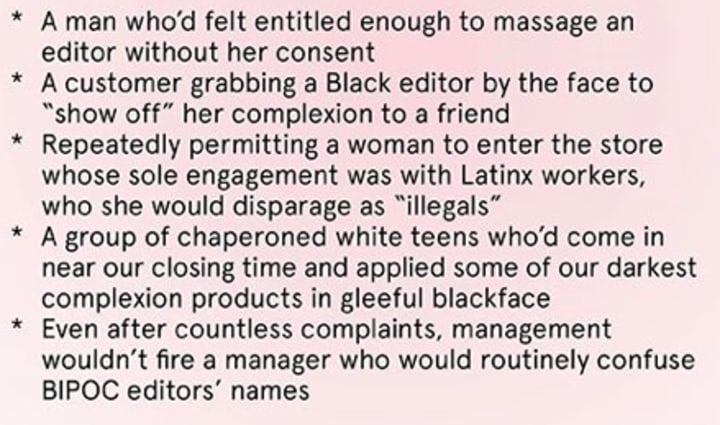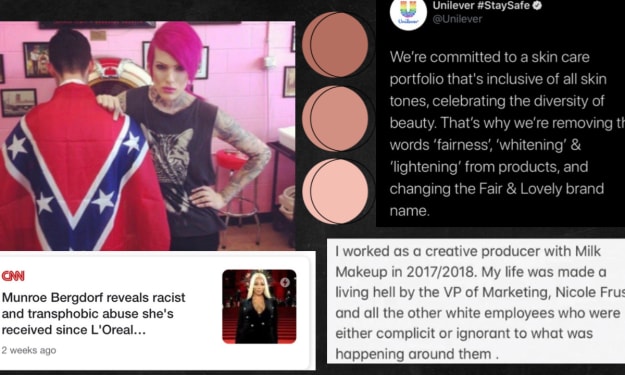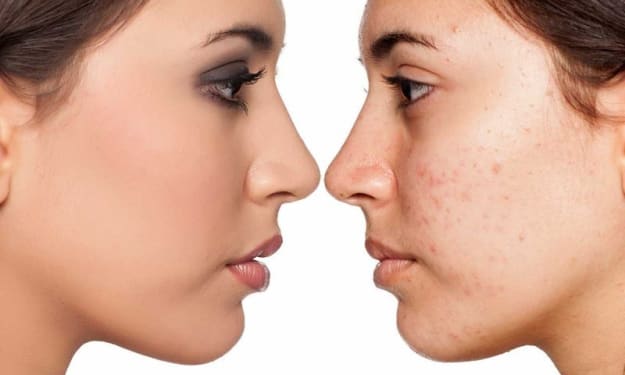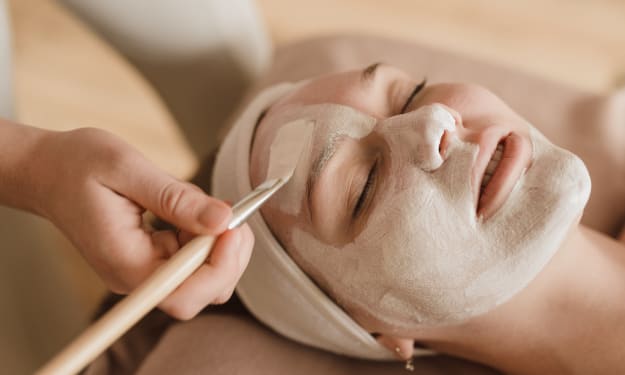Out of the Gloss: Standing in Solidarity with Former Glossier Employees
A recap of what former Glossier retail employees went through, and what changes the indie cosmetic brand needs to make.

There's something almost too perfect about Glossier. The baby pink Instagram account, the dreamy aesthetics surrounding their pop-up and flagship stores, the sleek and often minimalist packaging...it's all so perfect for a brand who thrives on simply enhancing the natural beauty of their millennial clients.
But like Lush, Glossier's sugary sweet pink exterior is just skin deep. In the past week an Instagram account entitled @outtathegloss popped up on the radar of indie makeup lovers across the web. To many, Glossier seemed like one of the good ones! They oft posted in solidarity of different social justice movements, established a grant for Black owned beauty businesses, and advertised their products as inclusive and perfect for everyone.
Yet to those of us who have had our little eyes on Glossier for a minute, there's been subtle red flags and incidences consistent with what former employees report. For example, the Instagram account @glossierbrown has over 500 posts documenting Glossier products on deeper complexions. Complexions which frequently are buried between fair skin tones on Glossier's official page. There have also been shade analyses done on their products, specifically the shade range for their "skin tint". According to @thesnoopdoggfanpage, who analyzes tons of shade ranges from all different brands using the CEI Lab code, Glossier's range is truly embarrassing. While there are only 2 shades for deep complexion, there are 3 shades for olive skin and 5 for fair light skin. The culture of pseudo-inclusivity former employees are speaking on runs deep, including into their product line.
Former Glossier employees go into extraordinary detail about what many of them experienced at the Glossier flagship store. They were told that having a "good personality" was a major factor in the hiring process, and often, more important than prior experience in the industry. This was just one example of how Glossier's flagship store's leadership silenced BIPOC employees from speaking out. The former employees -- called "editors" -- write that leadership was "ill-equipped to guide a diverse team through the unique stressors of working in an experiential store and assisting customers who are often justifiably frustrated by the disorienting Flagship [store] model." Because of, or in spite of this lack of ability by management, the former employees continually experienced harmful incidents (listed below) which leadership was unable to "diffuse or mitigate the harm of".

Former employees listed HR as a "dead-end resource"; from customer incidences not being dealt with to even issues around the filing worker's comp claims. Many of the individuals in leadership at the senior management level didn't have background in beauty or even retail store management, but instead in hospitality, which enforced the need for former employees to consistently satisfy customers above all else. Perhaps one of the most upsetting quotes from @outtathegloss's initial statement is about the constant looming cloud of replacement.
"Fewer than 5% of applicants get hired" was a managerial refrain, and in every context it is a stealthy cudgel against our frustrations: it was both "we chose you, and it's difficult to get chosen" and "there are many more people eager should you have too many complaints"...Former editors exasperated with the company's inability to adhere to its own published values have often sounded a death knell upon quitting, advocating for those still working at the store -- but they leave knowing that there's a young fan who, as long as they keep "cool" and are affable, will soon replace them and make fewer demands.
And with that, the former employees made two lists of action for the indie cosmetic brand: imminent action and continuous changes. The list for imminent action included an open Zoom call facilitated by editors/employees with the inclusion of Glossier execs and retail management, which focuses on equalizing BIPOC voices. The imminent action list also included a call for accountability, where Glossier will publicly acknowledge on all social media platforms the many years of pain they've caused employees. The continuous changes include a quarterly company wide anti-racism training course, changes around new management hiring processes, standardized anti-racism training for management, and HR liaison, reform around performance evaluations, and changes in the work environment.
But of course, as we've seen before from companies blissfully hiding behind the veil of wokeness, the response was underwhelming on Glossier's behalf. The CEO and founder of Glossier, Emily Weiss made a response initially on their corporate blog, buried away from the general public, unlike COVID19 and BLM posts which were plastered all over the company's socials. Then, on August 17th, the brand finally hopped on Instagram to make a formal apology. They note that in early June, employees had reached out to them detailing the racism, transphobia, and anti-Blackness they experienced at Glossier. In early June!! But apparently, it took former employees going public until Glossier found it necessary to make a statement? Okay, I guess.
Along with their apology they released a plan of action. According to the brand, they've been working on fixing the problems with retail locations since July, so actually there's no reason to complain now, guys! We're all good! Glossier is just soooo glad to have this "unique opportunity to do it right". Those "problems" they're "fixing" are vague to say the least. Starting with "dialogue", the brand says they'll be doing Zoom calls with former employees and will be compensated for their time. They also stated company-wide racial training and a new retail management approach which includes a new hiring process for managers and an outlet for employees to share feedback. There were also mentions of company-wide de-escalation training, creating a code of conduct, a reformed HR and performance evaluation system, "town halls", and changes in pay and compensation.
When you put it all in a paragraph, you think, "Wow that's a lot!" It seems as though Glossier addressed every point former employees had asked for. But many of the bulletpoints are vague, to say the least. For example, when talking about reforming the work environment, Glossier writes: "We will create and display a code of conduct for customers in all stores that sets clear expectations on behavior, and remove those who violate this code." That sounds awesome, right? But as of today (August 19th, 2020) no tangible code of conduct has been posted anywhere for consumers, and if it has, it isn't on their website, Instagram, or Twitter. That begs the question of the contents of this code of conduct. If "loudness" or "rudeness" from customers is unacceptable just as being outspoken and "loud" was/is unacceptable for employees, it almost feels like we're back at square one. Regarding the removal process for customers, will police officers or a security guard position be called/implemented in stores? If so, then was all the BLM posting just for show?
The former employees from @outtathegloss have thanked Glossier for their statement and will publish a full response in the coming days. But for now, all people can hope for is more transparency as Glossier reopens and implements their new reforms to the business.
You don't have to be a Glossier employee, former or current, to support those behind @outtathegloss asking for accountability and change from Glossier. Glossier, like many brands, have an almost cult-like following. If you're someone who buys product upon product from them, a rep, or even just a one time purchaser; it's important to put away your personal biases towards the brand. Obviously, Glossier will always do what they can do to please a customer or client. 9 times out of 10, the customer's experience with Glossier will be positive, even if at the employees expenses, as detailed.
Standing with ex-employees until their demands and needs are met by Glossier is paramount when it comes to changing a company's generally unsafe or bigoted methods. Boycotting product, consistently commenting on new Glossier posts asking for updates on accountability efforts, sharing @outtathegloss's posts so that more Glossier stans are aware are 3 of the most simple things we can do in the meantime.
Glossier relies on a "people-powered beauty ecosystem" (where products are accessible to everyone) to float by and hide under a veil of inclusivity. Much of Glossier's brand has less to do with inclusivity and more with profiting off of what's "in". After seeing beauty gurus and brands alike lose platforms and profit for their lack of inclusivity, Glossier got better at masquerading as one of the good guys. As eloquently put by @outtathegloss, "The Glossier 'propaganda machine' is optics based, courting a somewhat diverse customer base at the expense of those who actually sell their products".
About the Creator
Lillie Superstar
semi-professional face and hair toucher with a lot to say






Comments
There are no comments for this story
Be the first to respond and start the conversation.